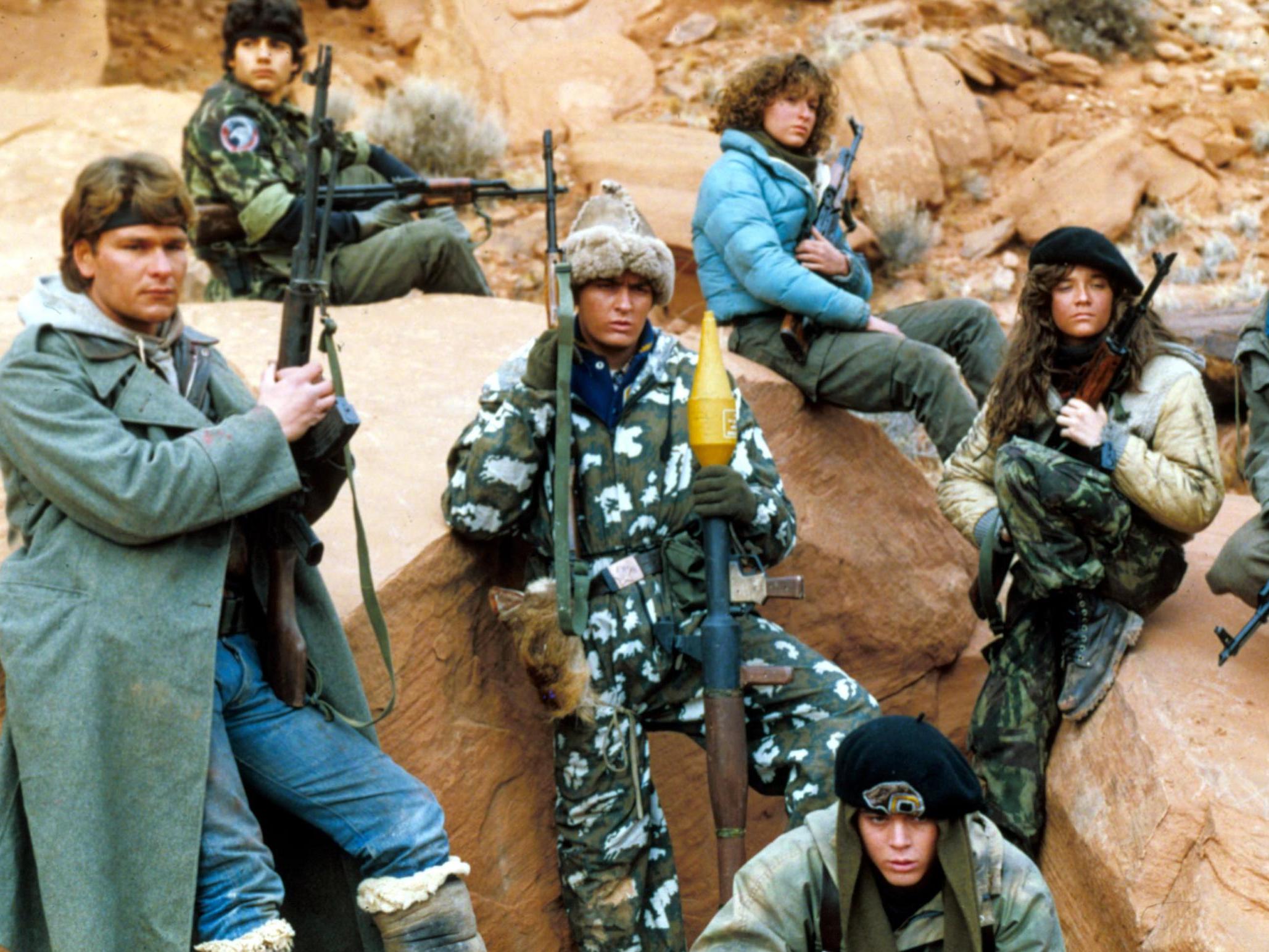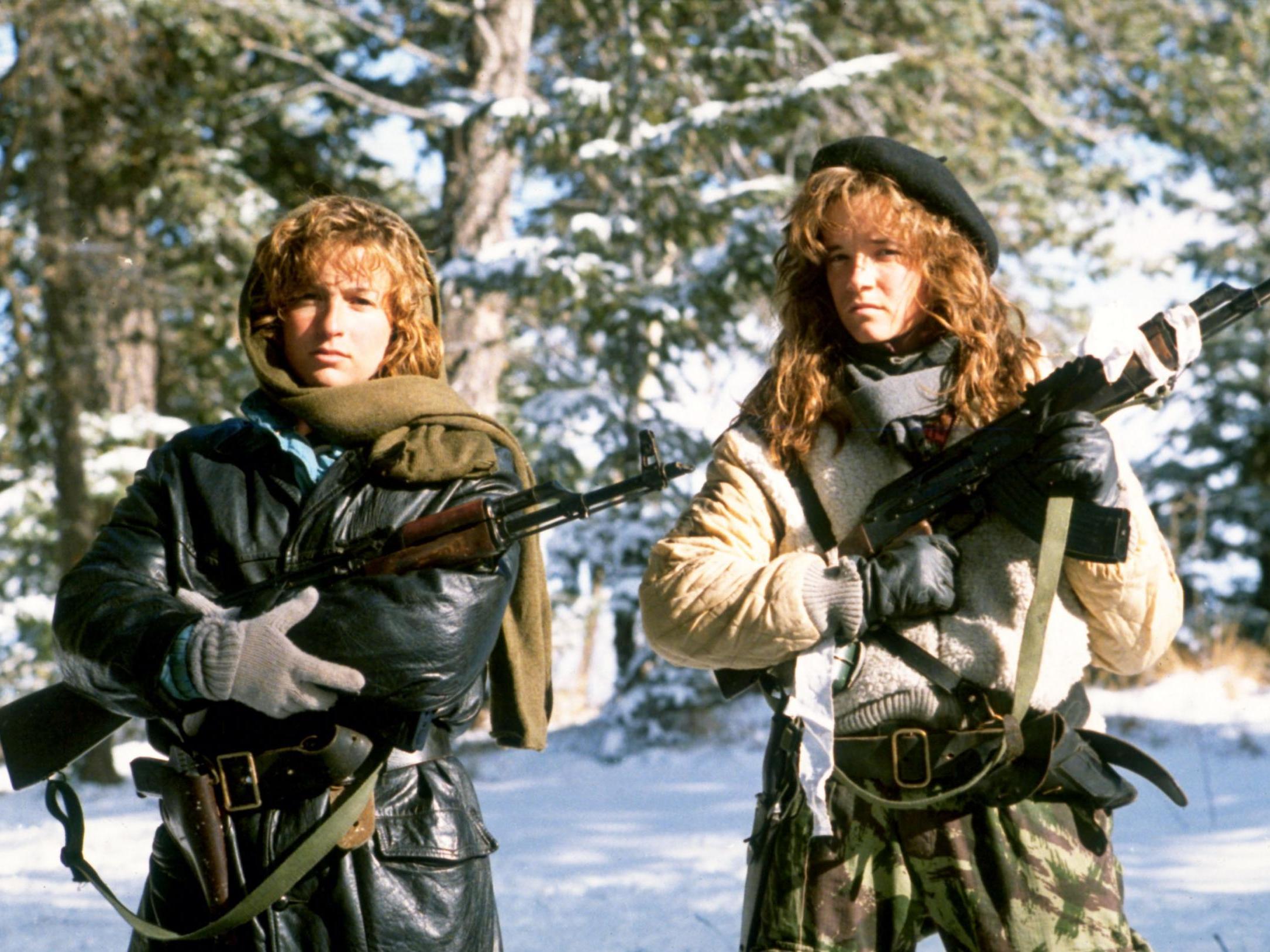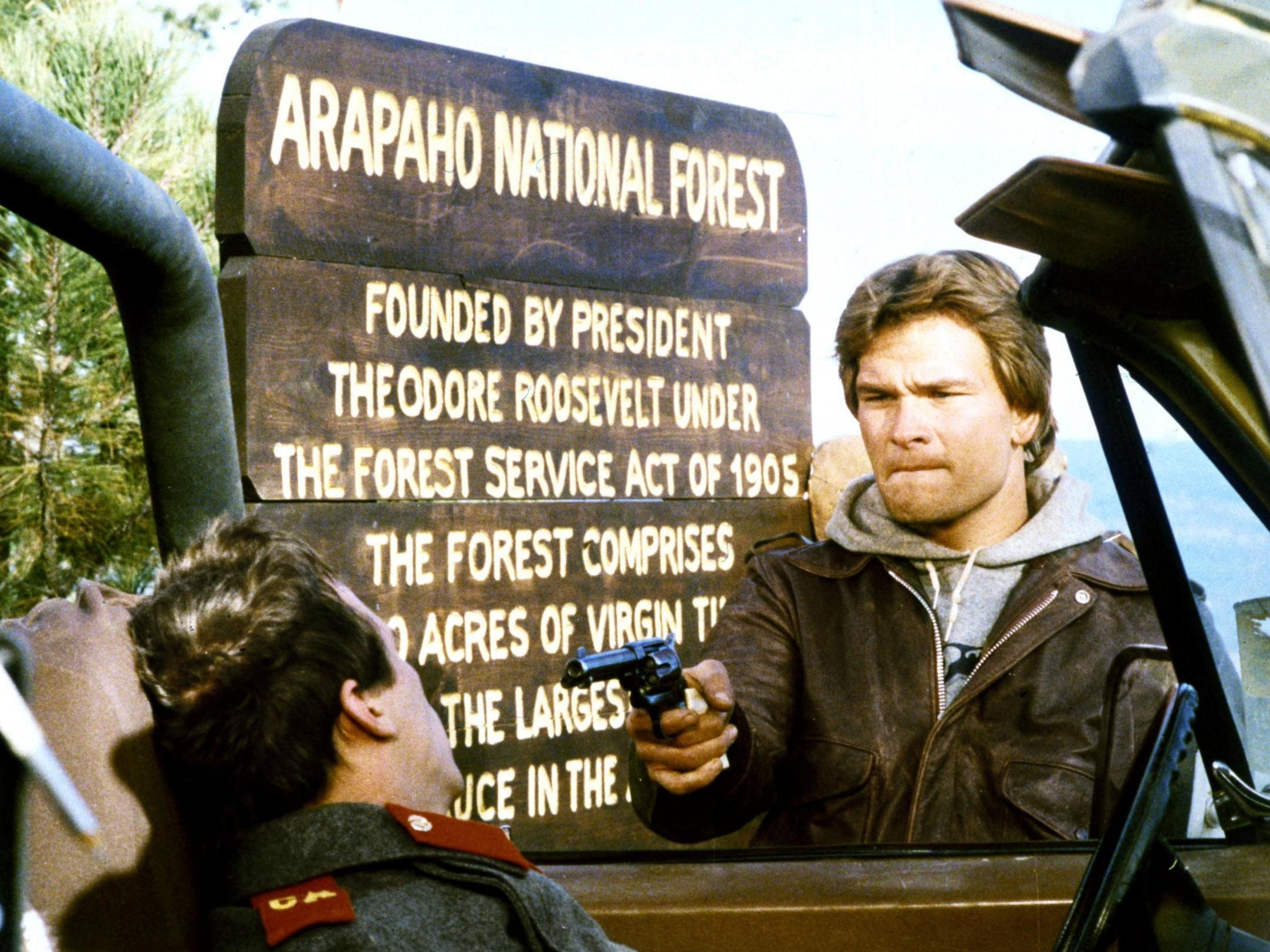American carnage: Was Red Dawn the most right-wing blockbuster ever?
As ‘Red Dawn’ turns 35, Ed Power looks back on the violent Eighties action film that was referenced in the latest season of ‘Stranger Things’

Your support helps us to tell the story
From reproductive rights to climate change to Big Tech, The Independent is on the ground when the story is developing. Whether it's investigating the financials of Elon Musk's pro-Trump PAC or producing our latest documentary, 'The A Word', which shines a light on the American women fighting for reproductive rights, we know how important it is to parse out the facts from the messaging.
At such a critical moment in US history, we need reporters on the ground. Your donation allows us to keep sending journalists to speak to both sides of the story.
The Independent is trusted by Americans across the entire political spectrum. And unlike many other quality news outlets, we choose not to lock Americans out of our reporting and analysis with paywalls. We believe quality journalism should be available to everyone, paid for by those who can afford it.
Your support makes all the difference.Eighties movies tend to feel sillier with the passing of time. But that tell-tale aura of retrospective cheesiness is absent from John Milius’s 1984 blood and soil epic Red Dawn.
Milius’s extended shoot-out, in which tall-haired teenagers from the heartland resist a Soviet, Cuban and Nicaraguan invasion, feels unsettlingly contemporary. It unfolds like a wham-bam fever dream stitched from random fragments of Donald Trump’s presidential inauguration speech. Behold American Carnage: the Motion Picture.
As Red Dawn marks its 35th anniversary, it looms large in the pantheon of Reagan-era action flicks. In terms of sheer body count, it is frequently cited as the most violent Hollywood production ever. The National Coalition of Television Violence identified “134 acts of violence per hour, or 2.23 per minute”. And it received the ultimate tribute recently when Stranger Things referenced it with its secret Soviet base subplot.
It is, furthermore, that rare shoot ‘em up that has no interest in post-modern winking or eye-brow waggling. Quippy one-liners in the Arnold Schwarzenegger tradition are entirely absent. Nobody is in on the joke because there is no joke to be in on. It’s just non-ironic firefight after non-ironic firefight as Milius’s “Wolverine” heroes – named for their high-school mascot – take on the Commies.
Europe and South America have fallen we discover as Basil Poledouris’s portentous score swells. That leaves just the US to stage the last stand against left-wing despotism: a beacon of hope shining as foreigners with funny accents institute a new world order.
This is as black and white as an action movie can be. From a political perspective, many will find its simplistic vision problematic. But the visceral punch of Red Dawn is nonetheless undeniable. It puts pedal to the floor early on and keeps it there to the end. It is one of the most relentless films ever made.
Red Dawn is also noteworthy for its all-star cast. In a strange way Milius was was treating us to an alternate universe brat pack showcase. It was the first major feature for Patrick Swayze, Charlie Sheen, Jennifer Grey (later to star opposite Swayze in Dirty Dancing) and Back to the Future’s Lea Thompson. Alongside them he cast ET alumnus C Thomas Howell and the elder statesman of crotchety character acting, Harry Dean Stanton.
All the principals are strikingly fresh-faced. With the exception of the mullet-sporting Swayze, the Wolverines look about 12 years-old. Their rawness and vivacity gives an additional chill to their brutal stand-offs with the Soviets. It’s kids against men – and the kids are winning.

Yet if Red Dawn was a springboard for its stars, for Milius it was the ultimate negative mark. He would complain his right-wing views led him to be blacklisted in the industry. Just like suspected communists during the Mccarthyite panic of the Fifties, he was cast into the wilderness.

Watch Apple TV+ free for 7 days
New subscribers only. £8.99/mo. after free trial. Plan auto-renews until cancelled

Watch Apple TV+ free for 7 days
New subscribers only. £8.99/mo. after free trial. Plan auto-renews until cancelled
“I knew that Hollywood would condemn me for it,” he later told a documentary about the making of the film. “That I’d be regarded as a right-wing warmonger from then on, uncontrollable and un-housebroken.”
The warmonger image was, to be fair, one he had himself cultivated. During interviews Milius would place a loaded .45 automatic on the desk: his way of telling the journalist he wasn’t another Tinsel Town leftie. The perception of the director as La-La Land’s gun-nut-in-chief was underscored with the announcement that his fee for directing Red Dawn was $1.2m – plus the firearm of his choice.
Yet Milius had a subversive side too. He had come to Red Dawn from 1982’s Conan the Barbarian. At one level, this was a muscle-bound fantasy romp. Schwarzenegger, wearing a glorified nappy, defeats James Earl Jones and his terrifying hair extensions. But it begins with a quote from Friedrich Nietzsche: “That which does not kill us makes us stronger”. And under the brawn and the blood, it’s a serious meditation on political power and legitimacy. Conan’s ultimate message is that we should beware of charming charlatans promising the sun and moon. Invariably, they are only interested in their own aggrandisement (obviously this has zero relevance today).
Milius had also written Apocalypse Now for Francis Ford Coppola. That broken rhapsody was hardly a chest-beating celebration of American hegemony. And he’d been offered the job of penning the script for Steven Spielberg’s Jaws. He demurred but agreed to help out with the problematic scene in which Robert Shaw’s captain Flint recounts the shark attack on the stricken crew of the USS Indianapolis at the end of the Second World War. Shaw’s monologue is among the most chilling in cinema history. The magic comes from Milius’s blunt poetry as much as from the actor’s gripping performance. “Eleven hundred men went in the water,” says Flint. “Three hundred and sixteen men come out... The sharks took the rest.” Simply reading those words brings on goosebumps.
Red Dawn was originally titled Ten Soldiers. The script had been hashed together by budding screenwriter Kevin Reynolds while still at film school. Reynolds would go on to direct Robin Hood: Prince of Thieves and Waterworld. Ten Soldiers was a disappointment for him as Milius essentially redrafted the entire script. “I brought the writer in and said, ‘This isn’t going to be easy for you to take because, you know, you’re kind of full of yourself, but I’m going to take this and I’m going to make it into my movie, and you’re just going to have to sit back and watch, and it may not be too pleasant,” Milius said to Creative Screenwriting. “My advice is to take the money you have and spend it on a young girl. Enjoy getting laid and write another script. Because this isn’t going to be fun to watch.’”
Reynolds had conceived of the film as psychological thriller more than blood-and-thunder action flick.The vibe was Lord of the Flies by way of Kubrick’s Paths of Glory. The college kids fighting the invaders begin to lose their trust in one another. At great cost, they discover the most dangerous enemy of all is their own paranoia.
Milius threw all that out. He reimagined the story as a gung-ho shootout with stars and stripes tassels affixed. It spoke to the director’s distrust of big government, regardless of whether the seat of power was Moscow or Washington DC. In the end, the film argues, the only person you can really count on is the one next to you in the trenches, locked and loaded and ready to fight.
“My script was about the resistance,” Milius said. “And my script was tinged by the time, too. We made it really outrageous, infinitely more outrageous than his vision. And to this day, it holds up, because people ask, ‘What’s that movie about?’ And I say that movie’s not about the Russians; it’s about the federal government.”
If the concept was ambitious, the execution was street-level gritty. Red Dawn begins with Soviets parachuting into a high school at Calumet, Colorado. They riddle teachers and pupils with bullets. A rag-tag of teens – led by Swayze’s Jed Eckert – escape and taste freedom high in the hills.
Months later, they return to their town seeking supplies. They see their families reduced to virtual slaves in the new Soviet order. So they do what every true blue American should (in Milius’ opinion) and lash out.
Thereafter, Red Dawn breaks down into a series of blistering fire-fights. Swayze leads the heroes, wearing his stoicism like armour plating. His solemnity was in part due to the grief he was processing after the death of his father, who had passed away weeks before filming began. As the oldest of the “teenage” army – he was actually a boyish 31 – he had also been tasked by Milius as a go-between.

Milius would give the orders to his “lieutenant”, Swayze. It fell on the actor to keep his fellow cast members in line. “He put a lot of responsibility on my shoulders. I was a little overly intense,” Swayze would say. “I think Jennifer Grey never wanted to work with me again after that.”
As with Conan and Apocalypse Now, the air of unrelenting doom is an acquired taste. Yet this grit has served as a preservative. Red Dawn holds up surprisingly well today. Not simply in terms of its action set pieces but in its portrait of America as a place where the frontier mentality lives on just beneath the surface.
The gargantuan body count made it controversial (it was the first release to secure the new PG-13 rating in the US). And critics hated it. “To any snivelling lily-livers who suppose that John Milius ... has already reached the pinnacle of movie-making machismo, a warning: Mr Milius’s Red Dawn is more rip-roaring than anything he has done before,” said The New York Times. “Here is Mr. Milius at his most alarming, delivering a rootin’-tootin’ scenario for World War II.”
It could have been even more contentious. Milius shot a scene in which Thompson, 22 and playing a high-schooler, asks Colonel Andy Tanner (Powers Boothe, 35) to sleep with her. The sequence was discreetly edited out. In the #MeToo era, it’s easy to imagine it placing Red Dawn completely beyond the pale.
Nor did Red Dawn set multiplexes ablaze. It took in $8m in its opening weekend and eventually limped to a $38m box office – disappointing given the hefty $17m budget. Still, Milius will have felt he’d achieved his goal. The film has become the ultimate expression of the American nightmare of Soviet invasion. As already pointed out, it was even riffed upon in the recent third season of Stranger Things, in which Russians build a base beneath Hawkins, Indiana.
All these years on, the director, now 75, will thus be proud that when people think of communists with iffy accents overrunning the US, they think of Red Dawn. And his Red Dawn, not the instantly forgettable Chris Hemsworth remake from 2012 in which North Korea serves as a limp stand in for the Red Army.
Join our commenting forum
Join thought-provoking conversations, follow other Independent readers and see their replies
Comments